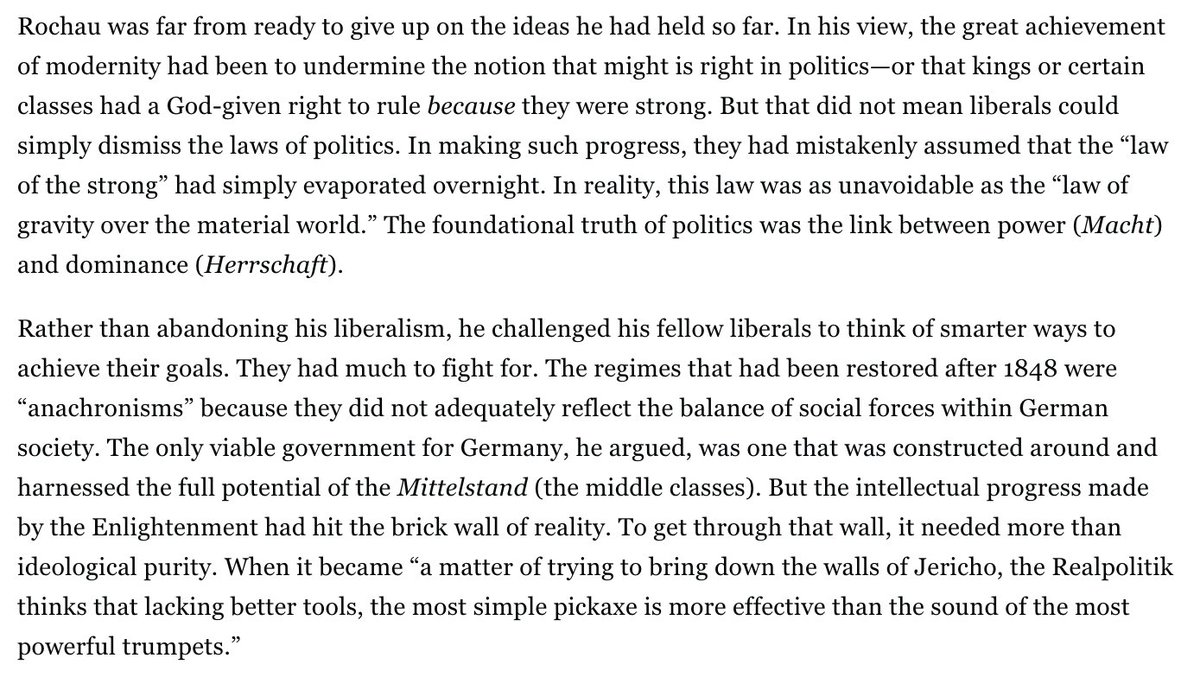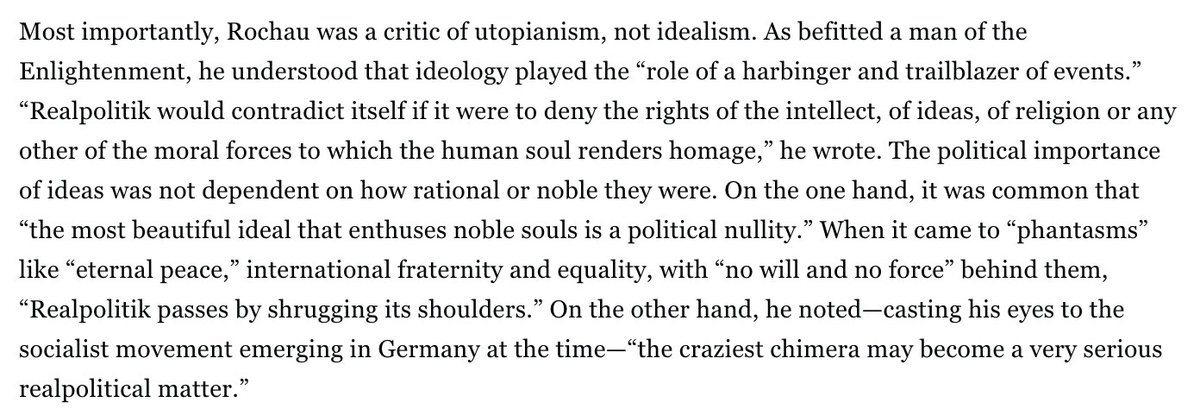I’m not sure that there is a “definitive” history on this topic, but John Bew& #39;s "Realpolitik: A History" is a good place to start. A thread: https://twitter.com/AHKydd/status/1390145276086824961">https://twitter.com/AHKydd/st...
In that book—an early, shorter version of which one can find below—Bew places the origins of modern realpolitik in the mid-19th century German states and in the work of Ludwig August von Rochau. https://nationalinterest.org/article/the-real-origins-realpolitik-9933">https://nationalinterest.org/article/t...
Rochau was a liberal who advocated for realpolitik in the wake of the failed 1848 revolutions. He and his fellow liberals, he argued, had lost sight of a central fact—as Bew summarizes, "The law of the strong is the determining factor in politics" (p. 32). https://global.oup.com/academic/product/realpolitik-9780199331932?cc=us&lang=en&">https://global.oup.com/academic/...
This is where one might link Rochau to folks like Thucydides, Sun Tzu, Kautilya, Machiavelli, and Hobbes, but Bew is arguing that Rochau begins a distinctly modern tradition of realpolitik in that his work is partly a response to emergent currents of liberalism and nationalism.
As Bew outlines in his @TheNatlInterest piece, Rochau argued that like-minded liberals needed to engage in power politics while avoiding utopianism (which he distinguished from idealism). Public opinion or the virtue of liberal ideas would not carry the day on their own.
The term realpolitik, however, would be coopted by more conservative Germans such as Otto von Bismarck, whose contemporary English and American interlocutors came to understand his foreign policy as "a fetishization of naked self-interest as an end in itself" (as Bew puts it).
The conflation of realism with militarism, amorality, and such might be understandable if we were to stop there, but those contemporary Anglo-American perceptions of Bismarck underemphasized the balance-of-power logic to Bismarck& #39;s externalized version of realpolitik.
As Paul Schroeder put it, for Bismarck, "Peace and stability were the tenuous result of balanced antagonisms and managed rivalries" (p. 98). https://www.palgrave.com/gp/book/9781403963574">https://www.palgrave.com/gp/book/9...
I think @nickdanderson is correct in saying that for most modern realists, this balancing logic plays an important role in leading to relatively restrained foreign policy prescriptions. A hyper-aggressive foreign policy will produce lots of push-back. https://twitter.com/nickdanderson/status/1390282469472092160?s=20">https://twitter.com/nickdande...
But to get back to the question of how realpolitik as restraint comes to American IR, it& #39;s in part by way of immigration. @pkmacdonald gets at the alignment between Hans Morgenthau and Reinhold Niebuhr on this point: https://twitter.com/pkmacdonald/status/1390280427785658374?s=20">https://twitter.com/pkmacdona...
Likewise, @SeanMolloyIR emphasizes the centrality of morality in Morgenthau& #39;s (and Carr& #39;s) thought. As he notes of Morgenthau downthread, "The key issue for him is how to determine the lesser evil," but there& #39;s a skepticism toward moral universals in IR. https://twitter.com/SeanMolloyIR/status/1390315605300072450?s=20">https://twitter.com/SeanMollo...
Thus, for @vmorkevicius, realists tend to "view wars fought for morality or justice as unnecessary and, to the extent that they waste military capabilities and even risk overextension, often incompatible with power-political concerns". https://doi.org/10.1111/isqu.12152">https://doi.org/10.1111/i...
I thus don& #39;t think that the extent to which realists prescribe restraint today is about domestic political preferences or "pessimism". There& #39;s more going on there. But as Bew makes clear, liberal preferences can coexist with realpolitik. Rochau certainly thought so!
Thus, as @PatPorter76 notes, realists can be concerned with "unrestrained action abroad not merely for prudential reasons...but also because (they/we argue) it damages domestic institutions, way of life, liberty": https://twitter.com/PatPorter76/status/1390328975642275848?s=20For">https://twitter.com/PatPorter...
Indeed, Waltz had preferences of that sort, but I don& #39;t think they originated with Vietnam. There& #39;s a trace of this in Man, the State and War (p. 228). If anarchy allows for the recurrence of war, Waltz writes, perhaps a world state—a truly global hierarchy—is the answer.
But it would be nearly impossible to craft such a thing, and any attempt would require a degree of coercion incompatible with his ideals: "were world government attempted, we might find ourselves dying in the attempt to unite, or uniting and living a life worse than death".
Finally, this is all situated in the context of Glaser& #39;s recent Foreign Affairs article: https://www.foreignaffairs.com/articles/asia/2021-04-28/washington-avoiding-tough-questions-taiwan-and-china">https://www.foreignaffairs.com/articles/...
As @shifrinson and others have noted, there& #39;s plenty of debate among realists on what exactly the U.S. should be doing in general but also vis-a-vis China because there are good-faith disagreements on threat assessments and such. https://twitter.com/shifrinson/status/1390285681180696579?s=20">https://twitter.com/shifrinso...
But among realist takes on China, I think there is at least one important commonality: a desire to avoid turning world politics into a morality play in which "we" are the good guys fated to win in the long run and justified in any steps taken to get there.

 Read on Twitter
Read on Twitter



